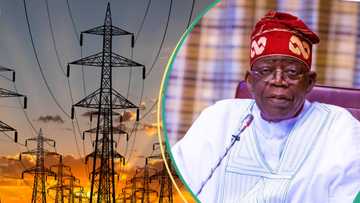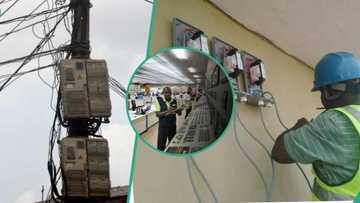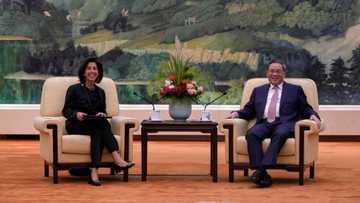Tinubu Should Invest in Digital, Renewable Energy To Improve Healthcare, Expert Gives Reason
- The Federal Government of Nigeria have been prompted by experts about the challenges of the country's health sector
- Healthcare and digital expert Atef Fawaz told Legit.ng that the administration of President Bola Tinubu must intentionally invest in digital and renewable energy
- Fawaz revealed that Nigeria can defeat mortality rates in suburban areas with adequate power supply
FCT, Abuja - The administration of President Bola Ahmed Tinubu has been urged to invest in a more sustainable and practical approach to revive the Nigerian health sector.
In an exclusive interview with Legit.ng, health expert and executive director of eHealth Africa, Atef Fawaz, said digital solutions and renewable energy are the two fundamental reforms required to revitalise the Nigerian health sector, especially in the rural and underserved areas.

Source: Facebook
Why renewable energy is essential
Fawaz stated that access to adequate power supply is a crucial criterion that must be upheld and prioritised by the government and other relevant sectors to improve primary healthcare facilities in rural areas.
PAY ATTENTION: Share your outstanding story with our editors! Please reach us through info@corp.legit.ng!
When asked why it was necessary, Fawaz said:
"Having access to power supply via renewable energy will go a long way in reducing mortality rate which was previously caused by infrastructural challenges in our health sector.
"It also provides an opportunity to explore new digital innovations that may be driven by the availability of alternative power sources in primary healthcare facilities.
"Sufficient power supply via renewable energy sources will also improve the stability of vaccine temperatures in our various cold chain facilities nationwide."
Fawaz recalled that vaccines, in most cases, are kept in cold chain equipment that requires a steady power supply so that the vaccines can be kept within a specific temperature to maintain their potency.
He stated that it would also open an opportunity to procure modern-day medical equipment that can help improve surveillance and early detection of diseases.

Read also
Ex-power minister Barth Nnaji speaks on cabal benefitting from poor electricity supply in Nigeria
Fawaz said:
"Additionally, this means we can also be able to conduct certain medical procedures in the country without travelling abroad.
"But then, we need to conduct audits of healthcare facilities or deploy geospatial tools that can help us identify locations of facilities that have low access to power supply.
"This will enable us to identify where and how to channel both financial and technical resources."
Challenges and causes of dilapidated healthcare system in Nigeria
Speaking on the impact of power supply and digital solutions in health facilities in underserved communities, Fawaz said inadequate power supply and little or no investment in alternative sources have greatly limited the quality of medical equipment that could be used in healthcare facilities.
He said:
"For instance, we have the opportunity to deliver vaccines to primary healthcare facilities in Sokoto state, but a handful of the facilities lack cold chain equipment that can receive vaccines and maintain them at the right temperature.
"This is partly due to insufficient power supply in the facilities, and sadly, this impacts the number of children that can be immunised against vaccine-preventable diseases in the state."
Fawaz rolls out recommendation for Nigeria's health sector
Fawaz recommended that the Nigerian government and other stakeholders become more intentional about restoring the health sector.
He said there is a need to build the capacity of locals, especially in remote areas, to harness alternative power sources even at the micro level to help improve healthcare delivery.
He stated that the constant use of generating sets and the continuous emission of pollutants like Carbon, amongst others, have proven to be dangerous to human health and constantly cause air pollution.
eHealth Africa's impact on Nigeria's healthcare system
Highlighting the contribution of eHealth Africa to revive the Nigerian health sector, Fawaz said:
"Our team is currently working on a Renewable Energy modular solution. eHealth Africa is deploying a modular solution that involves the design and implementation of renewable energy solutions for healthcare facilities, especially low-resource settings.
"We call it the Renewable Energy for Public HealthCare (RE4PHC) solar system. The system is designed to be deployed to health facilities with minimal access to power."
He stated that the RE4PHC modular system is designed to provide a 5KVA solar power system with an annual output yield of about 12,000 kWh (11756 kWh) and a reduction in CO2 emission by 6289kg per year.
Fawaz said it is enough to fulfil all the energy requirements of an apex primary healthcare facility per Nigeria's Minimum Service Package of primary healthcare facilities.
He said:
"The goal is to increase access to power for last-mile health facilities, especially in sub-Saharan Africa. Our RE4PHC solar system is affordable and reliable."
The International Renewable Energy Agency has reported that approximately one billion individuals globally rely on healthcare facilities suffering from inadequate access to electricity.
Furthermore, a separate examination of healthcare institutions in developing nations disclosed that more than 60% still need a dependable power source.
Conversely, Nigeria continues to grapple with electricity shortages, with the country's total nationwide power generation fluctuating between 4,500 and 5,000 megawatts while the actual distribution is considerably lower.
Health workers from Nigeria, Kenya, and Ghana to get £15 Million funding from UK
In a separate news update, Nigeria, Kenya, and Ghana have been selected to receive a £15 million grant from the United Kingdom to enhance healthcare services.
The decision to allocate funding to these countries was influenced by factors such as their elevated mortality rates due to large populations and inadequate healthcare staffing, among other socio-economic challenges.
This financial support is aimed at facilitating the realization of universal healthcare coverage.
Source: Legit.ng





